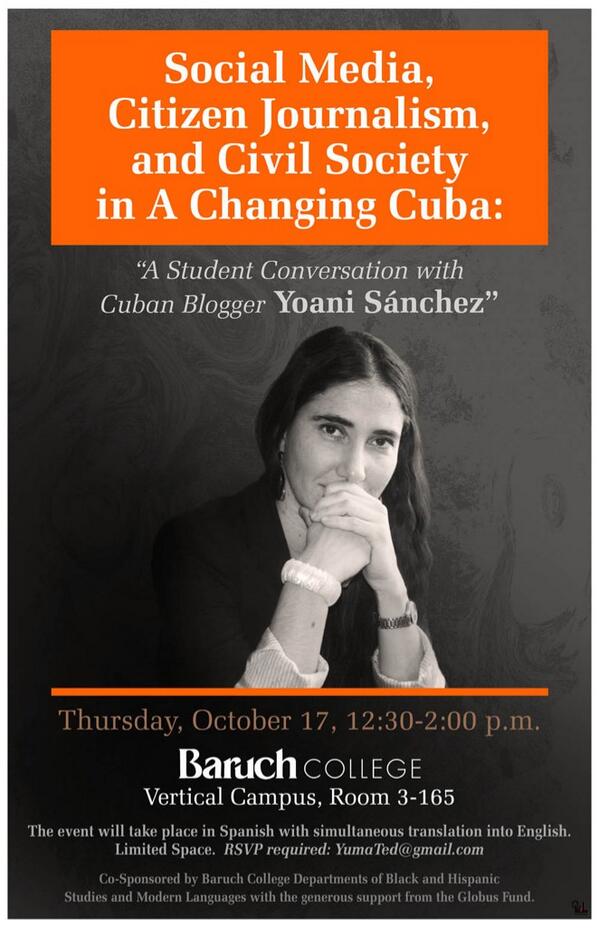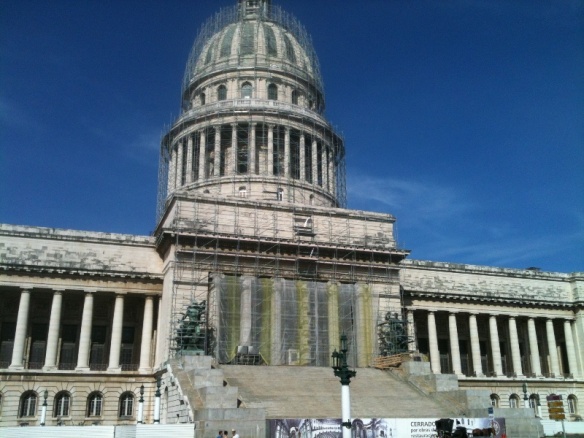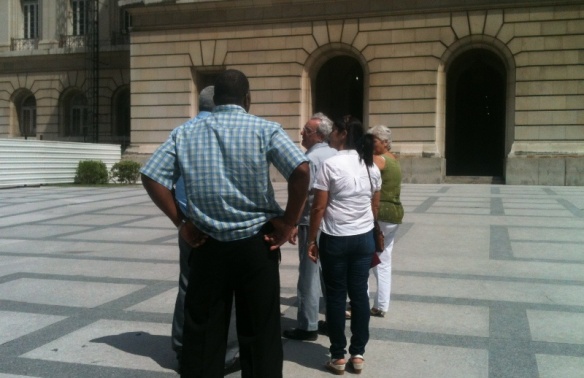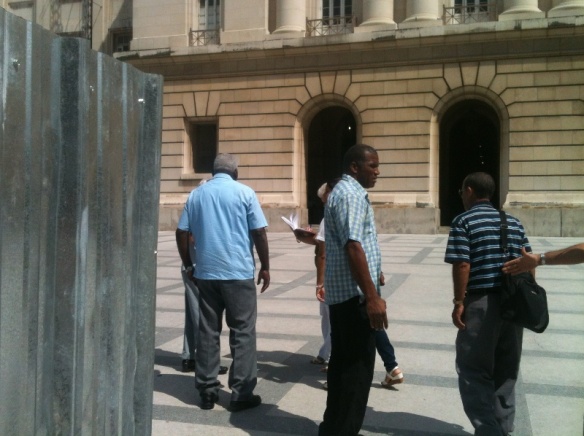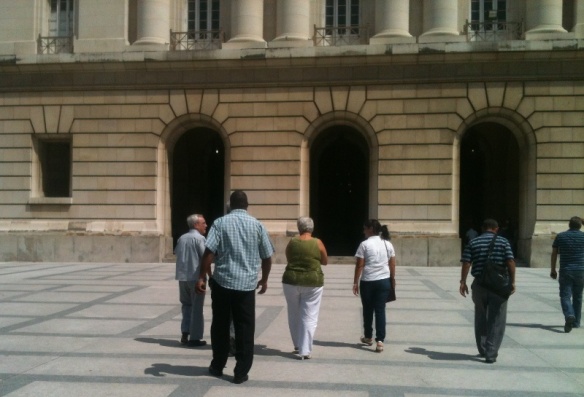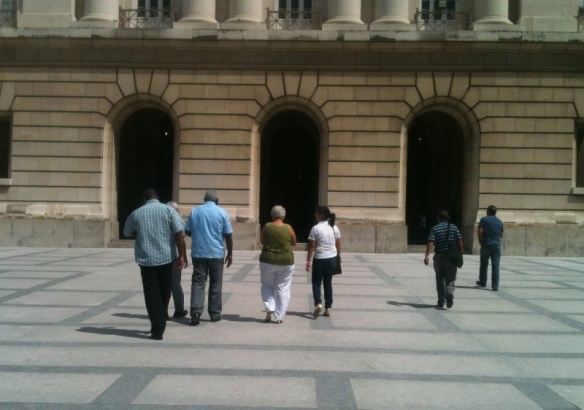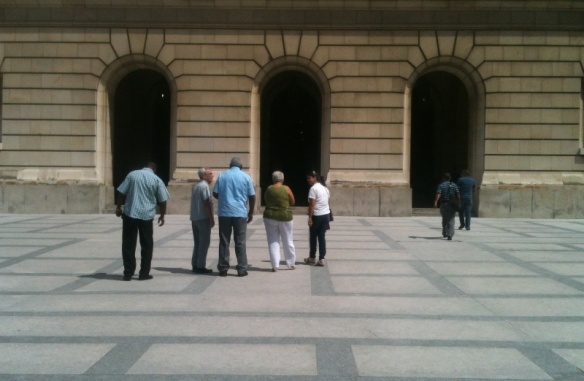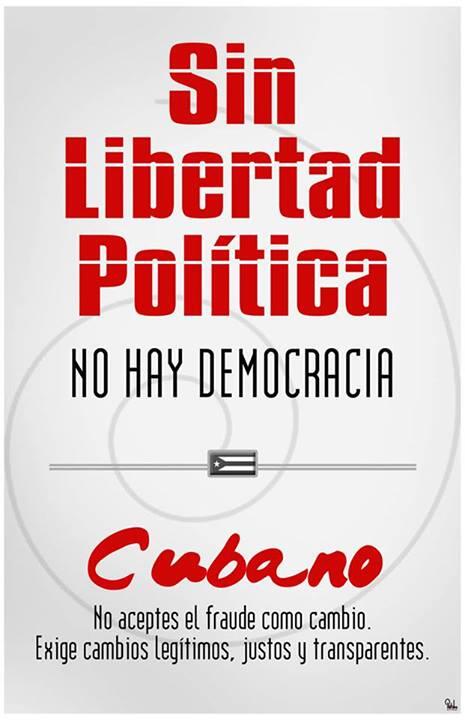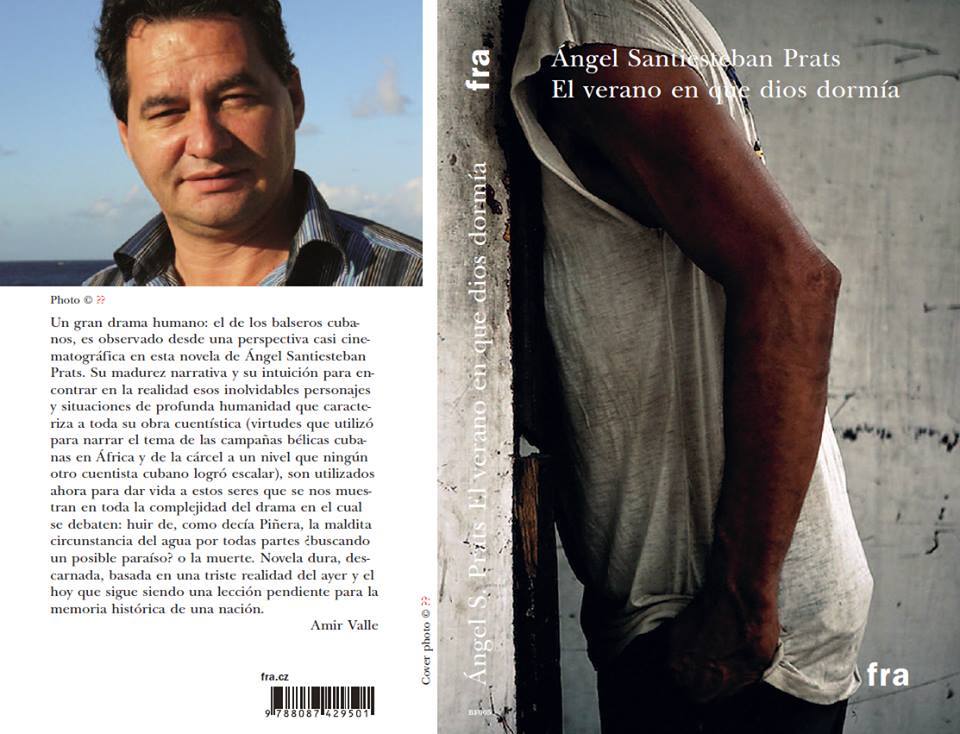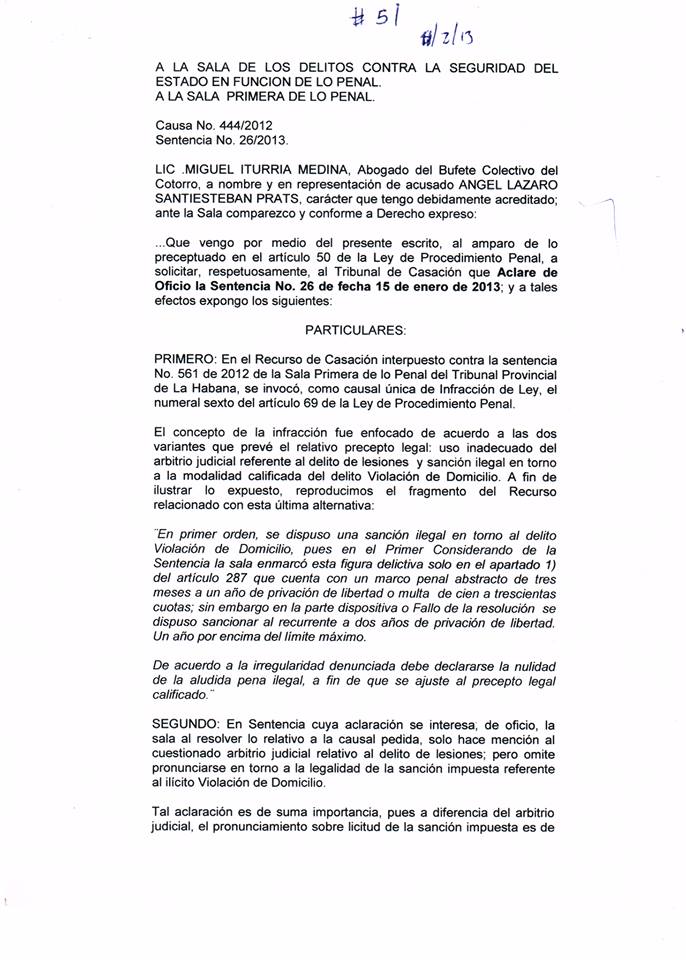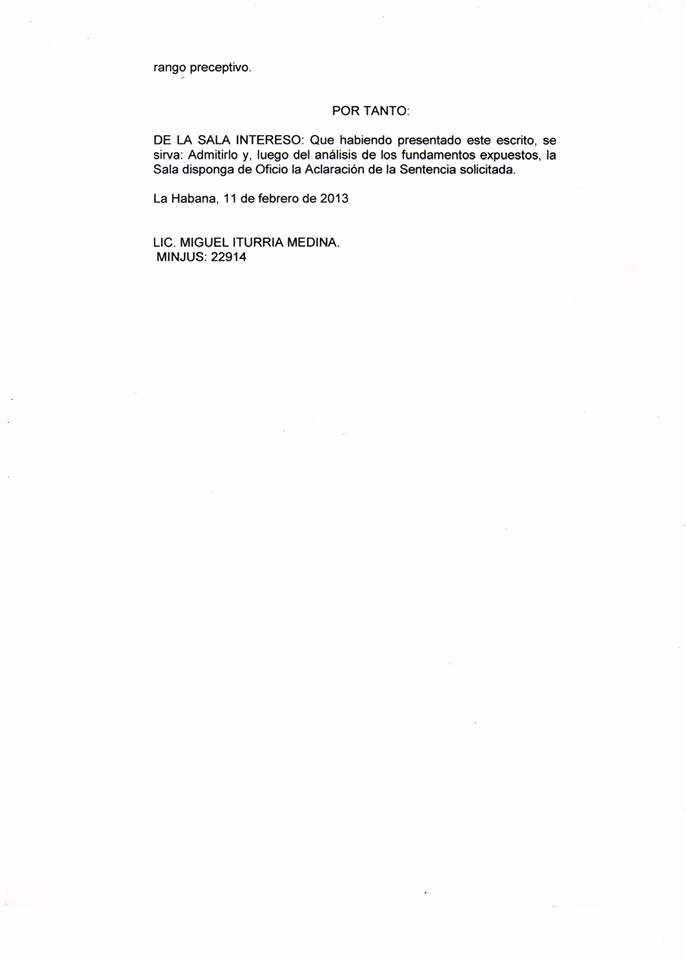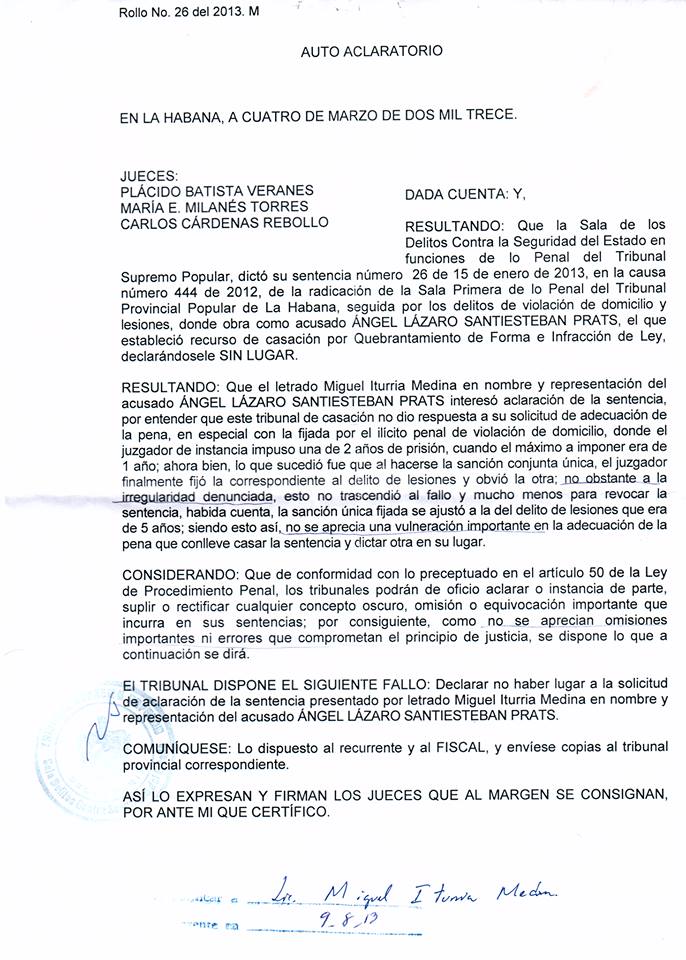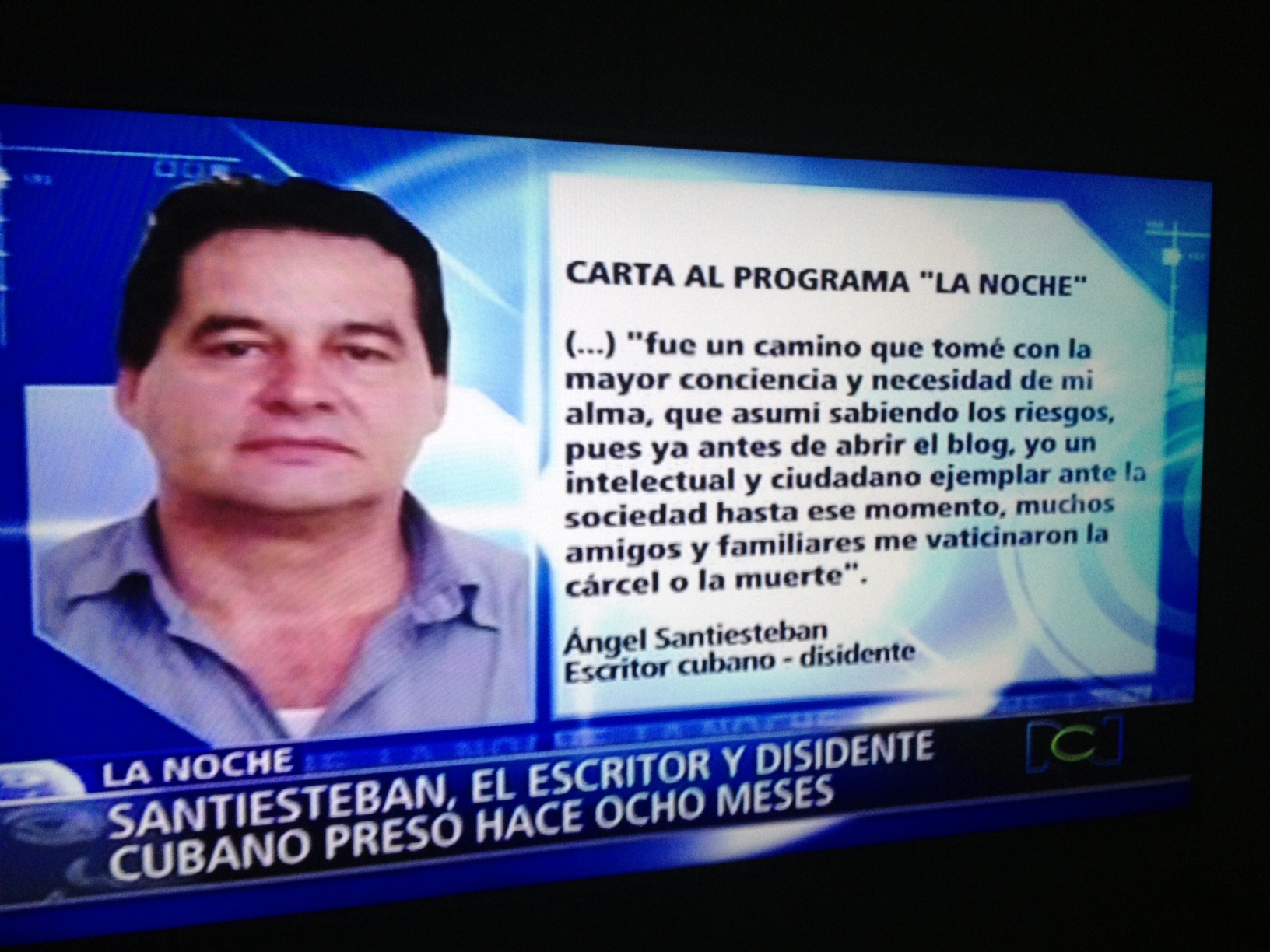Facebook: Unknown to Most Cubans / Jorge Olivera Castillo
 HAVANA, Cuba , October, www.cubanet.org – In the program “Passage to the Unknown” — Sunday nights on Cubavision — they aired a documentary that showed that young Cubans are last in line in the digital world.
HAVANA, Cuba , October, www.cubanet.org – In the program “Passage to the Unknown” — Sunday nights on Cubavision — they aired a documentary that showed that young Cubans are last in line in the digital world.
Among surprised and crazy faces, the segment showed a young woman on the street gathering opinions about Facebook, a topic addressed in the program by the journalist Reinaldo Taladrid, and “specialists,” among whom appeared the defender of official censorship: Iroel Sánchez.
To the question: Do you know what Facebook is? The few successes came from tourists and foreign students studying on the island.
In my neighborhood, he threw out the the question: What is Twitter?
For Alexander, a young high school student, Facebook could be a character in an adventure film. Rolando, however, a forest engineer with 20 years experience, is convinced that it is something related to auto racing.
What a horror! It makes you want to cry, or something worse.With the delay in using such a tool as essential as Facebook, who’s going to believe in the development of Cuba.
That young Cubans don’t know the social network that brings together a billion people, in 70 languages, shows the digital and technological backwardness of our country.
Emerging countries such as Brazil, India, Indonesia and Mexico are among the biggest users of Facebook, which forces us to recognize that we are lagging behind the digital world. We are at the back of the line of modernity.
We are an island frozen in time! Meanwhile the government remains committed to the internal blockade to maintain its absolute power.
The regime is not only leaving us as its legacy a country in ruins. In addition to the collapse of ethical and moral values, they are leaving us mired in digital illiteracy, with the goal of keeping themselves in power.
Jorge Olivera Castillo
From Cubanet 10 October 2013
Starting This Month, Thousands More Will be Unemployed / Osmar Laffita Rojas
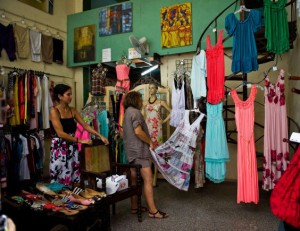
HAVANA, Cuba , October, www.cubanet.org – Of the 436,342 Cubans reported, as of the end of June, to have licenses to practice in the private sector (with the greatest presence in Havana, Matanzas Villa Clara, Camaguey, Holguin and Santiago de Cuba), the number of contract workers accounts for18%. This is evidence that in the past two years small private businesses have been the main source of employment for men and women, mostly young, at a time when the State sector reported excess payrolls, with a million workers who will have to be dismissed.
Among that 18% of contract workers, are those who work as clerks in the thousands of stores that sell imported clothes — a very great number — after those working in small restaurants, pizzerias and cafes, and drivers of cars and trucks rented for the transport of passengers and goods.
For residents of the major cities of Cuba has become normal to see in the doorways of many houses and premises areas adapted for the sale of factory-made clothing brought from abroad, which is very popular with the public, given that the clothes are more attractive than those found in the State’s Foreign Exchange Recovery Shops (TRD) — which is the formal name for hard currency stories.
The owners of these establishments, who are licensed as seamstresses or tailors, have paid their taxes monthly and submitted the affidavits of their sales, in which they state the number of employees hired.
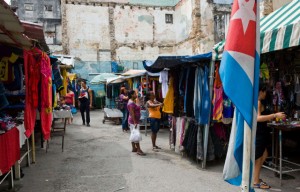 In general, business was good, until Marino Murillo Jorge, vice president of the Council of Ministers, at meetings of the National Assembly of People’s Power held on July 6 and 7, expressed alarm that the private sector, according to his remarks, “Is demonstrating indiscipline, among many of them, as is the case for those who have a license for one activity and undertake another.” He gave the example of dressmakers and tailors, who are involved in selling imported clothes. He said that this can not continue, “It will have to be rectified with a new legal standard that fixes the scope of each activity.”
In general, business was good, until Marino Murillo Jorge, vice president of the Council of Ministers, at meetings of the National Assembly of People’s Power held on July 6 and 7, expressed alarm that the private sector, according to his remarks, “Is demonstrating indiscipline, among many of them, as is the case for those who have a license for one activity and undertake another.” He gave the example of dressmakers and tailors, who are involved in selling imported clothes. He said that this can not continue, “It will have to be rectified with a new legal standard that fixes the scope of each activity.”
On the first of September, without waiting for tResolution 42 to go into effect, the Administrative Councils of the provinces of Pinar del Río, Sancti Spiritus and Cienfuegos banned the sale of imported clothing in all their municipalities.
And most recently, on the 26th of the same month, in a special edition, No. 27, of the Official Gazette of the Republic of Cuba published Resolution No. 353/2013 from the Ministry of Finance and Prices, referring to the rules for the taxation of persons engaged in private activity and monthly minimum tax account payments. Resolution No. 42/2013 from the Ministry of Labour and Social Security (MTSS) was also published, setting out the rules for the authorizations of private businesses.
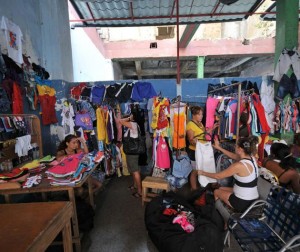 The MTSS Resolution clears up any doubts about activities that have been engaged in for a long time but that, according to Murilla, were never authorized by the license. It clarifies that the owners of seamstress and tailor licenses may engage in, “Making, fixing, and transforming clothes, performing simple and complex tailoring and sewing to measure, and this does not include trading in industrially manufactured or imported clothing.”
The MTSS Resolution clears up any doubts about activities that have been engaged in for a long time but that, according to Murilla, were never authorized by the license. It clarifies that the owners of seamstress and tailor licenses may engage in, “Making, fixing, and transforming clothes, performing simple and complex tailoring and sewing to measure, and this does not include trading in industrially manufactured or imported clothing.”
But this issue, as it is raised, causes a huge problem: Of those who have a license to engage in private activity in Cuba, 68% had no State employment, and 32% were retired State workers, which makes clear the negative effect the prohibition of sale of imported clothing will have.
Starting this month, thousands of people will join the ranks of the unemployed and their families will be plunged into poverty.
All indications are that the enforcement of the above Resolution is the result of pressure exerted by the colonels and generals who control retail trade in dollars. Looking at the balance of sales for the first semester set off alarms about the low “recovery of dollars” in the State stores. The precipitous drop in sales in the majority of TRDs is attributed to small private businesses engaged in selling imported clothes, which had won — fair and square — more than 85% of the clientele.
Osmar Laffita Rojas, ramsetgandhi@yahoo.com
From Cubanet, 11 October 2013
Angel Santiesteban Attends the Berlin International Literature Festival / Angel Santiesteban
Ángel remains imprisoned in Cuba, make no mistake about it. He continues to hope that his case will be reviewed. However his jailers could not prevent his presence crossing the Atlantic in order to walk freely through the streets, squares, parks and cultural institutions of Berlin.
This Friday the 13th, a date which many consider to be a bad omen, Berlin played host to a true act of literary justice. To the intention of the dictatorship to silence the voice of Cuban writer Ángel Santiesteban, the dictatorship received a devastating response: from Thursday afternoon and all day Friday, in different cultural centers of the city where activities were carried out as part of the International Festival of Literature, hundreds of copies of the document, “Short history of injustice”, were distributed, where it explains Ángel’s case to the invited writers, the international media and to the thousands and thousands of Germans and foreigners who attended what is considered the most important Literary Festival in recent years.
Thus at 7.30 pm, the main room of the Cervantes Institute was packed with the general public, most of whom were German although the presence of numerous Latin Americans was also noted, all interested in knowing the version of the events which would be offered by the Cuban writers José Manuel Prieto, Jorge Luis Arzola and Amir Valle, moderated by the prestigious German editor Michi Strausfeld.
The short introductory words of the Spaniard Francesc Puértolas, Head of Cultural Activities at the Cervantes Institute, made clear reference to the position of this institution to be a plural space where freedom of opinion is respected, regardless of the ideology that that opinion represented.
His words were a very brief response to another disrespectful Cuban government maneuver, through the “useful idiots” who are used outside Cuba to try to stop the campaigns denouncing the rottenness of the dictatorship. In this case, the German foundation “Netzwerk Cuba“, which brings together various associations which support the Cuban dictators, wrote an open letter in which it accused the Cervantes Institute of hosting a promotion of culture which was biased in favor of those who were serving the United States in their attacks on Cuba. In one of the paragraphs in the document, where a few historical truths are mixed with a lot of lies, they resorted to the hackneyed accusation that figures like Yoani Sánchez and Amir Valle were following agendas which had been formulated by the U.S. government in their plans against the island.
After the editor Michi Strausfeld explained to those present the personal and professional reasons why she had decided to get involved in the defense of Angel, she gave the floor to the writer Amir Valle to explain, in detail, the infamous trial for which Angel is now jailed. Valle began by apologizing to the Cervantes Institute on behalf of himself and his colleagues, because he considered the unfair letter of “Netzwerk Cuba” as offensive and disrespectful; a letter which was blatantly lying by stating that the Institute offered a partial image in favor of the enemies of the “Cuban Revolution” because earlier this year it served as a venue to meet in Berlin with the blogger Yoani Sánchez and now they hosted activity to talk about violations against freedom of expression in Cuba.
Valle said that this accusation was contradicted by the simple fact that the Cervantes Institute, on numerous occasions, had hosted Cuban writers and intellectuals who had spoken in favour of the regime, among whom he mentioned the president of UNEAC (Cuban Writers and Artist Union), Miguel Barnet and the recent Cuban National Literature Prize winner, Leonardo Padura. In the heated discussions in the audience at the end of the activity, those present would learn that among others, Cuban writer Nancy Morejon, filmmaker Fernando Perez and artist Arturo Montoto, who have all been praised by the regime, just to mention some of the prominent guests, had been at the Cervantes Institute in recent times.
Afterwards, Valle commented that he was there as a colleague, brother and legal and literary representative of Ángel and, step by step, he described the infernal trap in which the political police hounded the writer after which he decided to go public with his criticism of the system prevailing in Cuba through his blog “The Children Nobody Wanted,” and he reminded those present that the document circulated at the Festival could interest them in discovering all the evidence of the wicked deed.
Michi Strausfeld later read fragments of a letter sent from Cuba by Ángel and gave the floor to the writer Jorge Luis Arzola, who recounted his personal experience with the Cuban political police and he referenced cases similar to Ánge’s, although much less traumatic, such as what happened to the narrator and poet Francis Sánchez when he also decided to open his own blog, receiving so much pressure and threats against him personally and his family that he decided to give up.
Once again, Michi Strasfeld read another letter which allowed the public to know what a day in the life of Ángel as a prisoner of the regime was like. The images described by Ángel, with the same naturalness and visual power which is present in his stories, touched all that were present as they informed Strausfeld, Prieto, Arzola and Valle of such at the end of the activity.
José Manuel Prieto later offered his personal vision of his experience as a writer who can travel to the island (something which neither Arzola nor Valle can do, because the regime has already prohibited their entry) and he concentrated his exhibition on the slow changes which were occurring in the aforementioned rigid and monolithic social and governmental structure, among which, the permissibility which the government was demonstrating towards the emergence of alternative spaces for citizen reflection was unthinkable in years gone by and it also ruled in favour of Ángel’s case being reviewed with true justice.
To close the evenings events, Valle presented a beautiful edition of the book “The Summer When God Was Sleeping”, with which Ángel Santiesteban recently won the Franz Kafka Novel Competition. Valle, to clarify for those who see any project to support those who oppose the regime as CIA-funded, stressed that this was purely a literary award, organized by an information platform (inCUBAtor) that is supported by the Czech NGO ’Libri Prohibiti’, a civic organization that, among other merits of cultural work, has the largest Samizdat library in Europe.
The interest aroused in the audience only further manifested itself just as the activity came to an end: many people approached the writers to ask more about the specific case of Angel and about the situation of freedom of expression in Cuba. “One of the participants approached me with a group of documents we distributed, about twenty of them, and asked me to sign them and told me: ’I will pass these out to several of my colleagues that go to Cuba on vacation and always come telling me about how beautiful the beaches are. I want them to know that there is a much tougher life away from the beach, the sun and Cuban rum’”, Valle recounted to a journalist. Another German, a well-known bookseller, approached the writers and told them “When we were listening to you speak, we commented amongst ourselves that we felt that Mr Santiesteban was up there sitting next to those were at the activity.”
Thus it was like this that Ángel Santiesteban was there, to infuriate his jailers, smiling, with that tranquility of someone who knows that they walk the right path: one of dignity and the defence of his thoughts. Later, while shadows fell over Berlin and the city started its fabulous cultural and social nightlife, he decided take a walk through the streets and walked talking, laughing, remembering the days when they were young and happy and naive, hugging his friends, then and always: Amir Valle and Jorge Luis Arzola. Michi Strausfeld was also laughing at seeing them together, another time, after almost ten years since their last meeting in Cuba.
The Editor
Translated by Shane J. Cassidy
14 September 2013
Eusebio Leal and Esteban Lazo Visit the Capitol Building / Luzbely Escobar
This Tuesday afternoon, passing in back of the Capitol, I ran into Esteban Lazo and Eusebio Leal entering through a small door in the tin fence that has been erected around the site. Some experts were showing them the restoration work taking place and, I suppose, talking as well about the results. Sadly, they did not let me pass and I had to settle for taking photos from the entryway.
It’s been said that Eusebio Leal’s time is “over” these days, but those of us who work in Old Havana have the impression that he is still at the forefront of many things.
11 October 2013
Without Political Freedom There is No Democracy / Rolando Pulido
I Plead with the UNEAC’s Defence Committee / Angel Santiesteban
Prison Diary VIII. Shameful silence
I heard the terrible news that a Lady in White, Iris Perez Aguilera, was savagely beaten. Despite these recurrent allegations of abuse against these women, we will never be able to get used to it, nor have we with that we have seen.
These women from the opposition who struggle against the regime like true 21st Century Mambises* are disrespected and abused by those who defend the totalitarian system, particularly national security. As if the beating given to her wasn’t enough, she was then denied hospital access.
At the end of last year I also saw, with my own eyes, 15-year-old Berenice Héctor González, who was slashed all over her body and face simply for being related to a Lady in White. She was mercilessly attacked by the daughter of a police officer in the province of Cienfuegos for calling for respect for her aunt who is in opposition to the government.
As always, some pro-government bloggers have tried to spin the story that the criminal attack was the result of “blind passion”.
Recently, at the beginning of the year, Elsa Rubio Fernández, the daughter of another Woman in White, Mercedes Fernández Fonseca, was assassinated. Elsa did not receive police protection despite the five complaints lodged and the fact that the murderer shouted “that he was killing her and he he wouldn’t have to pay for it because her family were opponents”.
I sincerely appeal to the honesty of those eight women** who have raised their voices in defence of women so that they have the decency to show solidarity with these victims of real abuse.
Hopefully silence will not be the response of these intellectuals who must now demonstrate their own grandeur and ethics.
Ángel Santiesteban-Prats
La Lima prison. March 2013.
Translator’s notes:
*Mambises is a term used to refer to independent guerrillas who, during the 19th Century in Cuba and Philippines, fought in the independence wars for Cuba and the Philippines.
** Ángel is referring to eight women, members of UNEAC (Cuban Writers and Artists Union), who signed a letter condemning him for violence against his ex-wife — the trumped up charge for which he was sent to prison.
Translated by Shane J. Cassidy
1 April 2013
The Diana Buses Are Already Broken Down / Roberto Quinones Haces

GUANTANAMO, Cuba, October 7, 2013, Roberto Quiñones Haces/ www.cubanet.org – I’ve seen them circulating and and I remember that on a news broadcast on National Television they talked about them. They are called “Diana” and from last September, eight of them have to been to Guantanamo to improve public transport.
The new buses bear a lot of resemblance to those mid-sized “Girón” buses, which were also assembled in the Evelio Prieto plant in Havana, and dedicated primarily to student and intercity transport. According to a report from the journalist Raciel Sayú Font on the weekly “Venceremos” (We Shall Overcome) broadcast, put on by the provincial committee of the only Party, the vehicles have a capacity of 42 passengers, 28 seated and 12 standing, although the reader will see that this adds up to 40, not 42 as stated by the journalist.
The vehicle body is Brazilian, the diesel engine is Chinese, and the rest of the components come from Russia. The journalist said that Rodolfo Labadies Limedux, a transportation specialist at the Transport Agency, said that the vehicles passed technical reviews and met the quality and safety standards, but that they were out of service due to breakdowns, according to the report.
The information could not be published earlier because provincial and municipal transportation officials refused to provide details to this newspaper. The journalist is careful in mentioning names, but beyond identifying those responsible, it is obvious that the event shows although hundreds of Cuban Journalist Union (UPEC) congresses have called for an end to secrecy, those who have the last say are not exactly the journalists.
At least, as long as the buses in good condition keep circulating, Guantanamo’s residents will have two routes that have been reestablished after having been out of service for fifteen years. The route crosses the city from south to north and vice versa, but now it costs a peso each way, instead of the usual twenty centavos.
These buses represent a transportation alternative to the horse-drawn carriages, a private service that has helped people a lot in recent years but that dirties the city contaminates it. To completely remove the horses, the coachmen and all they leave behind, with the displeasure and dangers this service carries with it, Guantanamo needs a great many more Diana buses and, above all, for them not to breakdown prematurely.
From Cubanet, 8 October 2013
Spanish post
10 October 2013
Current Ideas / Dimas Castellanos
One hundred and twenty-five years after his death on August 11, 1888, the scientific results that the eminent chemist, physiologist, agronomist, industrial technologist and science writer Alvaro Reynoso y Valdez bequeathed us are still on the waiting list. While the official Cuban press pays exaggerated attention to events and people linked to politics and wars, it limits mention of Reynoso as part of the celebrated anniversaries without investigating his work or pressing for his contributions to become productive results.
Alvaro Reynoso, one of the Cubans who collaborated through science for the progress and formation of the basis of the Cuban nation, studied at San Cristobal (Carraguao) college, graduated with a Bachelor of Science from the Havana Royal and Literary University, continued his studies at the Sorbonne in Paris, where he graduated in 1856 and obtained a doctorate, becoming one of the best chemists of his era.
From the earliest years of study he began to publish his scientific results: a new procedure for the recognition of Iodine and Bromine; diverse new combinations of ammonia in ferrocyanides; action of the bases on salts and in particular on arsenides; separation of phosphoric acid from its combinations with metallic oxides; the presence of sugar in the urine of sick hysterics, epileptics and its relationship to respiration; the effect of bromide on poisoning by curare (a poison used by Indians to poison their arrows); studies about the artificial breeding of freshwater fish, and others.
On graduating in 1856 some twenty of his works had been presented in specialist publications in France and Spain. He was elected a Corresponding Member of the Academy of Exact, Physical and Natural Sciences of Madrid and the Royal Academy of the History of Spain, he received the Royal Order “Professor of Chemistry Applied to Agriculture and Botany” from the Havana General Preparatory School and the “Professor of Enlarged Organic Chemistry” at the Central University of Madrid, among many honors.
On returning to Cuba in 1858 with a laboratory endowed with the most modern equipment and instruments, an excellent mineralogical collection and a valuable scientific library, he took possession of the Chemistry Chair and in 1859 replaced Jose Luis Casaseca as the director of the Havana Institute of Chemical Investigations, an institution that he converted into one of the world’s first agronomic stations.
Parallel with his investigative work he dedicated himself to writing. In 1868 he began to collaborate as scientific writer for the Marina Daily, where he had a column in which he published articles about drinking water; he reviewed the first trial carried out in Cuba in April 1863 of the Fowler steam-powered plow, with which he began the mechanization of sugar cane in Cuba; he was a writer of the Annals and Memories of the Royal Development Board and the Royal Economic Society; he published in the Magazine of Agriculture of the Ranchers Circle on the island of Cuba and in other press organs.
Among his published works are: Details About Various Cuban Crops, where he compiled his contributions about non-sugar cane agriculture such as corn, coffee, cotton, tobacco; Progressive Studies on Various Scientific, Agricultural, and Industrial Subjects, a collection of articles published in the press about the cultivation of sugar cane in all its phases, as well as experimentation plans by the Institute of Chemical Investigations and the planting of sweet potatoes, yams, corn and rice destined for human and animal consumption.
In the middle of the 19th century, when Cuba was first in the world in production of sugar and the last in productivity, supporting his thesis that the true making of sugar is in the reeds, he devoted himself to resolving this contradiction. The results were gathered in his crowning work Study of the Culture of Sugarcane where he integrated all the related operations with the culture and harvest of the grass, from the negative effect of the logging of virgin forests to fresh grinding for avoiding alteration of the juices. This work published in 1862 was re-published in Madrid in 1865, in Paris in 1878 and in Cuba in 1925 where it was re-printed in 1954 and 1959 in addition to being published in Holland.
An aspect of his ideas which is barely mentioned, is that Reynoso considered the autonomous participation of the Cubans in the political estate reform of the colony as a legitimate demand. That’s why, in his systematic analysis he never avoided the topic of agricultural property. He considered, just the same as Francisco de Frias and Jose Antonio Saco, the need to establish a sugar cane agriculture with native small farmers and immigrants, where the incentive of ownership, much different from the slave system, was a basic component to push forward the modernization of the agricultural economy.
However, in the year 2001, when due to the continuous decrease in sugar production, less than 3.5 million tons, the then Sugar Industry Minister, General Ulises Rosales del Toro announced two projects to reverse the situation: one, to restructure the sugar industry aimed at achieving industrial performance of 11% or extracting from each 100 tons of sugar cane, 11 tons of sugar; and the other one baptized with the name of the distinguished scientist with the objective of reaching 54 tons of sugar cane per hectare. With both projects, as announced then, Cuba could produce 6 million tons of sugar (the amount produced in Cuba in 1948).
Towards that end, instead of taking into account all the elements which participated in the production process as taught by Reynoso, some 100 sugar factories were closed, with the land distributed for the use of other crops and sidestepping the damaging state monopoly on land ownership. The amount of 2002-2003 harvest – the first after the implementation of the “novel task and one of the worse of all times” – was 2.1 million tons, barely half of the production in 1919.
From there and until the present time the industry inefficiency, the unavailability of sugar cane, the low results of land usage and the high cost of production per ton has repeated year after year. In the last harvest, 2012-2013, the plan of 1.7 million tons was not reached for many reasons, but especially because of the unresolved problem of the land tenancy was attempted to be resolved through the leasing approach known as usufruct, maintaining the inefficient State as owner and the economy subordinated to politics and ideology; which shows not only in the sugar production but in the agricultural production and all facets of the economy.
Taken from: Diario de Cuba
14 August 2013
Prison Diary LVIII: Inside Prison, Outside the Drawer / Angel Santiesteban
This last 13 September, a Friday, while the Instituto Cervantes de Berlín was presenting my novel “El verano en que Dios dormía” (The Summer God Was Sleeping), the winner of the Czech Republic’s International Franz Kafka Prize of Novels from the Drawer, I was overcome by fever. The dengue fever virus had taken over my body and sapped my strength.
While my strength gave way, my mind, in turn, was concerned with defending, as always, that little space of harmony in which, like an inner island, I live and immerse myself, to protect myself from so much injustice and evil coming from the Communist Government. From that imaginary place, I feed myself and construct the events in that distant and endearing country where my friends and brothers await, and where I was close to those excellent intellectuals — Jorge Luis Arzola, José Miguel Prieto, and Amir Valle — and as a panelist, the German editor, cultural maven and person of immense feelings, the imponderable friend and godmother of writers from the “Los Novísimos*” generation, Michi Strausfeld — who is presenting my novel, promoting it, and as if that weren’t enough, making the world aware of the injustice committed against me, and why I am incarcerated.
Knowing the work of the Cuban Government, presumably they would elaborate a scathing plan to wreck this cultural space, and they tried to through a public letter from the German “Cuban Network” foundation, accustomed to giving its support to the Castro brothers’ totalitarian regime, a foundation whose right we recognize to do so, however unjust it seems, coincidentally the same right to criticize, expound on reasons, points of view, that we demand for all Cubans, and which for realizing we are punished with impunity, as every dictatorship does against those who reject its designs.
The truth is that neither the regime nor illness diminished the joy of feeling myself a physical part of the presentation at the Berlin International Literature Festival. Between the fatigue and high fever, I thought about the book, friends, readers.
It is my infinite desire to thank those who have, for several years, supported the competition and brought to light books that the Regime censors, and thanks to this beautiful and just effort, prevented these literary creations from sleeping in drawers; I also thank the Jury who awarded the prize to my novel; and the intellectuals, cultural promoters from different countries, and my friends who put so much effort into this presentation, and above all for their political and social ideals, giving weight to culture, our primary reason for being. And to the Czech NGO “Banned Books,” and their clear cultural management.
The novel “The Summer God Was Sleeping,” like the rest of my books, attempts to be a photograph of my time, to give a voice to those testimonies of Cubans who risked and are risking their lives to achieve freedom and rights, and who cross the Strait of Florida, trying to evade the pursuit of the dictatorship, in order to leave behind the material shortages and political repression. On this they wager their most precious possession, their lives. Once again, I try to present my time and our time. I know that’s not enough, I need to double my efforts, and to this I bravely turn my efforts.
Ángel Santiesteban-Prats
Lawton Prison Settlement. October 2013
*Translator’s note: “Los Novísimos” (The Newest) is a name that has been given to Cuban writers such as Angel who began to publish in the 1990s — during the so-called “Special Period” — and whose works reject the values of the Castro regime.
8 October 2013
Another Scandalous Political Maneuver in the Trial Against Angel Santiesteban / Angel Santiesteban
The so-called Cuban justice, which is nothing more than another of the pathetic military arms of the political police of the dynastic dictatorship which is clinging to power for more than half a century, has shown – once again, of course – the audacity and impunity with which it always tramples on the law and the rights of those on the island, believing that we would sit idly by, complicit in another violation of the law and ethics.
On the 11th of February, Ángel Santiesteban’s former defence lawyer, Miguel Iturria, presented before the Havana Court of Appeals a request for clarification on the sentence imposed on the 15th of January 2013, regarding the serious irregularities which occurred during the whole trial and sentencing. The request, which would have been responded to if Cuba was a state which adhered to the rule of law, never received an answer.
On July 4th, Ángel Santiesteban-Prats’ new lawyer, Amelia Rodríguez Cala, presented to the Judgement Appeals Review, complying with all arranged elements under existing law, demonstrating that the trial was based on offenses which were not proven because he did not commit them, the use of false testimony on the part of the prosecution, refusal to accept testimony showing the defendant’s innocence, scandalous links between the political police and judicial the bodies which violate the separation of powers, and judicial irregularities throughout the whole process. Nor, until today, has there been a response to that request for review of the trial and on August 28th, Angel marked 6 months in unjust incarceration.
A few weeks ago, the lawyer Muguel Iturria received the ruling in response to the request for clarification on the sentence which was made on the 11th of February. On the 8th of August the answer to his request was, as many feared, negative.
That they have announced this ruling 6 months after clarification was requested and that this announcement happens “coincidentally” at a time when a response to request of the lawyer Rodríguez Cala is expected, once more provides evidence and lays bare the scandalous justice of Castro, revealing that it only works for those who are driven by opportunism and political maneuvering, trying to outwit those who proceed according to law. This time they have done this with another blatant overbearing maneuver which doesn’t adhere to what is established in law, to avoid being told that justice does not answer the claims of citizens. However such maneuvers don’t fool anyone, it proves once again that in Cuba justice doesn’t exist, they lost another opportunity to rectify their violations of the law against Ángel and, at least for once, to do justice.
This unjust ruling adds to the lengthy record that teaches the world how in Cuba there is no rule of law, as they violate human rights and there is no separation of powers in the state.
Raúl Castro Ruz, the world is watching you: sooner rather than later, those who shall be accountable to justice shall be you and your minions.
The Editor
Translated by Shane J. Cassidy
9 September 2013
No Remedies, Political Changes / Martha Beatriz Roque Cabello
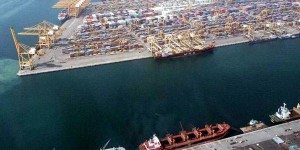 HAVANA, Cuba, October, www.cubanet.org — Raul Castro has repeated constantly that errors are the greatest enemy of the Revolution, those that have been committed and new ones that may be committed. Nevertheless, he does not speak of the political changes necessary for correcting those errors, since the so-called reforms are not enough, particularly because of how slowly they advance.
HAVANA, Cuba, October, www.cubanet.org — Raul Castro has repeated constantly that errors are the greatest enemy of the Revolution, those that have been committed and new ones that may be committed. Nevertheless, he does not speak of the political changes necessary for correcting those errors, since the so-called reforms are not enough, particularly because of how slowly they advance.
Such “reforms” have been good only for the discourse abroad, but within the country they have negative results, from the social and economic point of view. Income inequalities are more noticeable, and today begging is significantly increased. The small role they have given to the private sector does nothing to confront the grave crisis.
Economic reforms require political changes. And although modifying the Constitution of the Republic has been spoken of superficially, the fact that the communist party is the superior directing force of society and the State perpetuates the lack of liberties, installing the government as all-powerful so that it does not worry about the people’s problems.
Although the regime maintains a policy of centralization of the means of production, it could think about speeding up some services. Nevertheless, we are already seeing symptoms of the Nicaraguan style of “piñata.” And as is natural, the beneficiaries are the high officials of the army and of the ministry of the interior. The possibility of creating non-agricultural cooperatives is accompanied by this characteristic syndrome of regimes in decline.
Those who think that the current situation will end with solutions like the Mariel Special Development Zone are wrong. Modifying or updating the economic model is talked about, but you cannot modify something that does not exist. If they tried to copy what is permitted in China and Vietnam, they fell short, and the legislation is very far below what should have been allowed.
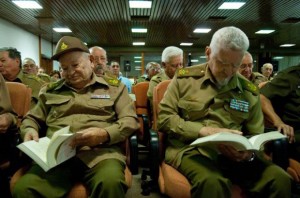 The Legal Decree that establishes the Special Development Zone shows that the regime knows that a profound change towards a market economy is necessary. Among the objectives it pursues are attracting foreign investment and creating a logistical system that permits high levels of efficiency in the import, export and distribution processes. Both areas behave inefficiently within the Cuban economy.
The Legal Decree that establishes the Special Development Zone shows that the regime knows that a profound change towards a market economy is necessary. Among the objectives it pursues are attracting foreign investment and creating a logistical system that permits high levels of efficiency in the import, export and distribution processes. Both areas behave inefficiently within the Cuban economy.
They may keep taking mediocre measures (including those who propose that they legalize lottery gambling, as in the early years when the National Institute of Saving and Housing existed and one could buy lottery bonds), but that will only contribute to delaying the true change by some years. Sooner rather than later, the situation of increasing poverty, the enrichment of a few, and the “piñata” that now is distributed among those at the top, will defeat the worn out “construction of socialism.”
A good recommendation would be to stop the suffering of the people and affect true political, economic and social reform. As a first step, they should free the political prisoners and stop the harassment and beatings of dissidents, while leaving aside the false discourse that calls for strengthening national unity around the Party and the Revolution, because without doubt the regime knows that, although they continue prohibiting it, in Cuba there now exists broad ideological diversity.
From Cubanet, 10 October 2013
Translated by mlk
Angel Santiesteban-Prats on “The Night” on NTN24 / Angel Santiesteban
The programme ” The Night” on NTN24, exclusively revealed a letter [which can be read here, in English] from the dissident writer Ángel Santiesteban, who is currently serving a five-year prison sentence in Cuba.
The writer alleged that he had received “constant death threats” since he was incarcerated. Equally, the dissident defended his innocence through his writing and questioned the justice of the Castro brothers, Fidel and Raúl, on the island.
Translated by Shane J. Cassidy
10 October 2013
Latin America Witnesses the Repression in Cuba Thanks to Television / Angel Santiesteban
“The Night”, on top of doing an excellent job denouncing the dictatorship of the Castro family, the repressive situation which has existed in Cuba and the violation of human rights on the island, has dedicated a privileged space in its programme for Ángel Santiesteban-Prats, who will soon have completed eight months incarcerated after a judicial farce with invented charges by the political police, using the mother of his son to place false accusations against him with the only objective to silence his critical voice against the regime, and therefore they intend to keep him imprisoned for five years.
But so clumsy and so thinly disguised are the crimes that it wasn’t sufficient for them to jail him for being innocent but to jail him for political crimes according to them, they offered him his freedom in exchange for renouncing his political position, becoming the first ordinary criminal to whom they offered the freedom in order for giving up his political activism. A strange way of understanding freedom which the dictator Castro Ruz has.
All our gratitude to Claudia Gurisatti, Jeferson Beltrán, Jason Calderón and the Cuban Lilo Vilaplana, tireless figther for the freedom of Cuba for the rights of their brothers and Friend (with capital letters),
in the name of Ángel Santiesteban-Prats,
The Editor
Translated by Shane J. Cassidy
11 October 2013
Letter from Angel Santiesteban to NTN24 / Angel Santiesteban
Hello to the viewers, the team who works for “The Night Moves”, in particular to their presenter, greetings to the persistence of friends like the director and the writer Lilo Vilaplana and to Antonio Rodiles, who directs the cultural space and social project State of SATS.
Dear friends, this month marks eight months that I have been imprisoned, and my departure on this primetime programme with a continental reach.
I am not lying to you if I admit to you that I never could have believed that the dictatorship would be able to imprison me knowing that I’m innocent, not because there remains an ounce of sanity of justice in them but because they provoked a wave of protests, so that to expose the evidence of the prosecution and that of the defence, the political game behind the circus mounted against me is clear.
Of course, as a totalitarian regime they have made a show of force, they have once more shown what they are capable of doing to voices which oppose the dictatorship, especially if they are within the Cuban archipelago. I know that my life has been thrown into danger, the mysterious deaths of the opposition leaders exposes their crimes. I have received constant death threats since my arrival in prison, where they have assured me that I will not leave with my life. What also makes it difficult is that there are many eyes of solidarity watching me on an international level. They have also offered to give me liberty if I desist from my opposition ways, or if I change them they proposed my definite departure from the country. In both cases, I refused flatly.
At any rate, the worst will come if needs be, it was a path I took with full conscience and for the necessity of my soul, I took it knowing the risks, because even before opening the blog, I, an intellectual and exemplary citizen to society thus far, many family and friends predicted jail or death for me.
Of course, I don’t want to be a martyr, my dream is to continue being a writer and be able to tell what is happening in my country the hopes and disappointments of my contemporaries. They know that if this doesn’t come to pass, I prefer it, since what I could not tolerate is to continue living in my country under the slavery of one of the most intelligent and ferocious dictatorships which has existed on the face of the earth.
When all will be revealed, many will be ashamed of having supported it, justifying that they did not know.
To you all, my eternal gratitude, long live Cuba and may it be free!
Ángel Santiesteban-Prats
Lawton prison settlement. October 2013
Translated by Shane J. Cassidy
10 October 2013
